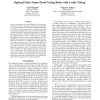Free Online Productivity Tools
i2Speak
i2Symbol
i2OCR
iTex2Img
iWeb2Print
iWeb2Shot
i2Type
iPdf2Split
iPdf2Merge
i2Bopomofo
i2Arabic
i2Style
i2Image
i2PDF
iLatex2Rtf
Sci2ools
103
click to vote
AAAI
2008
2008
Optimal False-Name-Proof Voting Rules with Costly Voting
One way for agents to reach a joint decision is to vote over the alternatives. In open, anonymous settings such as the Internet, an agent can vote more than once without being detected. A voting rule is false-name-proof if no agent ever benefits from casting additional votes. Previous work has shown that all false-name-proof voting rules are unresponsive to agents' preferences. However, that work implicitly assumes that casting additional votes is costless. In this paper, we consider what happens if there is a cost to casting additional votes. We characterize the optimal (most responsive) false-name-proofwith-costs voting rule for 2 alternatives. In sharp contrast to the costless setting, we prove that as the voting population grows larger, the probability that this rule selects the major
Related Content
| Added | 02 Oct 2010 |
| Updated | 02 Oct 2010 |
| Type | Conference |
| Year | 2008 |
| Where | AAAI |
| Authors | Liad Wagman, Vincent Conitzer |
Comments (0)

